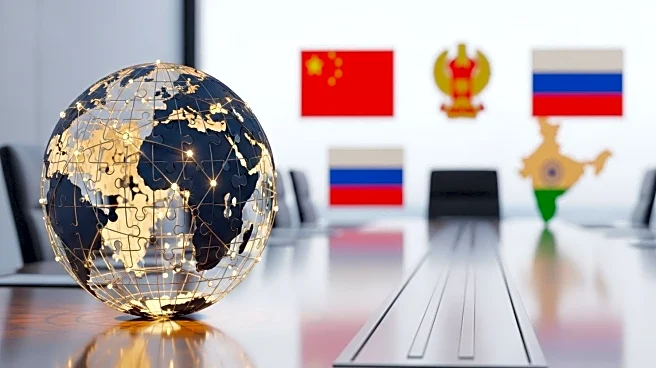What's Happening?
Chinese President Xi Jinping has proposed a new global security and economic order during the Shanghai Cooperation Organization (SCO) summit in Tianjin, China. The summit, attended by leaders from over 20 non-Western countries, including Russian President Vladimir Putin and Indian Prime Minister Narendra Modi, emphasized rejecting hegemonism and power politics. Xi's 'Global Governance Initiative' aims to challenge U.S.-dominated international organizations and promote China's leadership. The summit highlighted the SCO's potential as a mega-scale market and economic opportunity, with Xi proposing the creation of a new SCO development bank and offering financial aid and loans to member states.
Why It's Important?
Xi Jinping's initiative represents a significant shift in global power dynamics, challenging the traditional U.S.-led international order. By promoting multilateralism and regional cooperation, China seeks to strengthen its influence among non-Western countries. The proposed SCO development bank and financial aid could enhance economic ties within the region, potentially reducing reliance on the U.S. dollar and circumventing U.S. sanctions. This development may impact global trade patterns and geopolitical alliances, as countries in the Global South explore alternative economic partnerships.
What's Next?
The SCO summit may lead to increased collaboration among member states, particularly in economic and security sectors. The proposed development bank and financial aid could facilitate infrastructure projects and trade agreements, strengthening regional ties. Additionally, China's efforts to mend relations with India and promote cooperation in lunar research and artificial intelligence may foster technological advancements. The upcoming military parade in Beijing, showcasing China's latest military technology, could further assert China's position as a global power.
Beyond the Headlines
The summit's emphasis on multilateralism and regional cooperation may influence global governance models, encouraging countries to seek balanced power structures. China's initiative could prompt discussions on ethical and legal dimensions of international relations, as nations navigate the complexities of shifting alliances and economic dependencies. Long-term, this development may contribute to a more multipolar world order, with diverse centers of influence shaping global policies.









